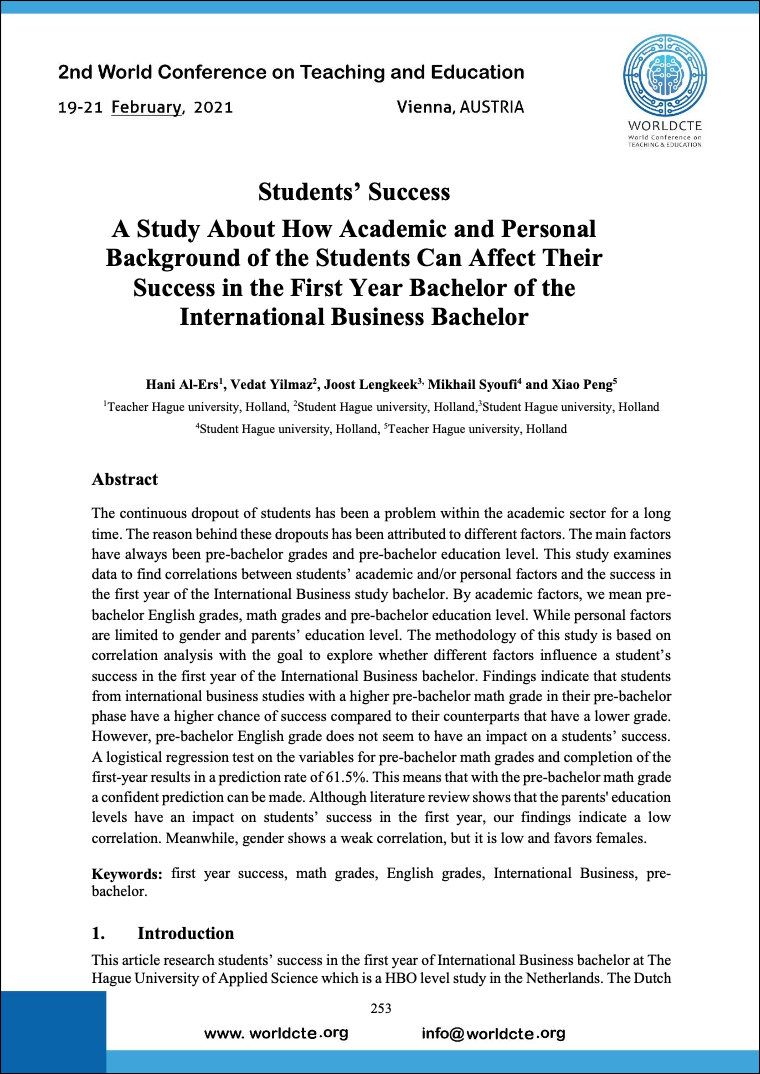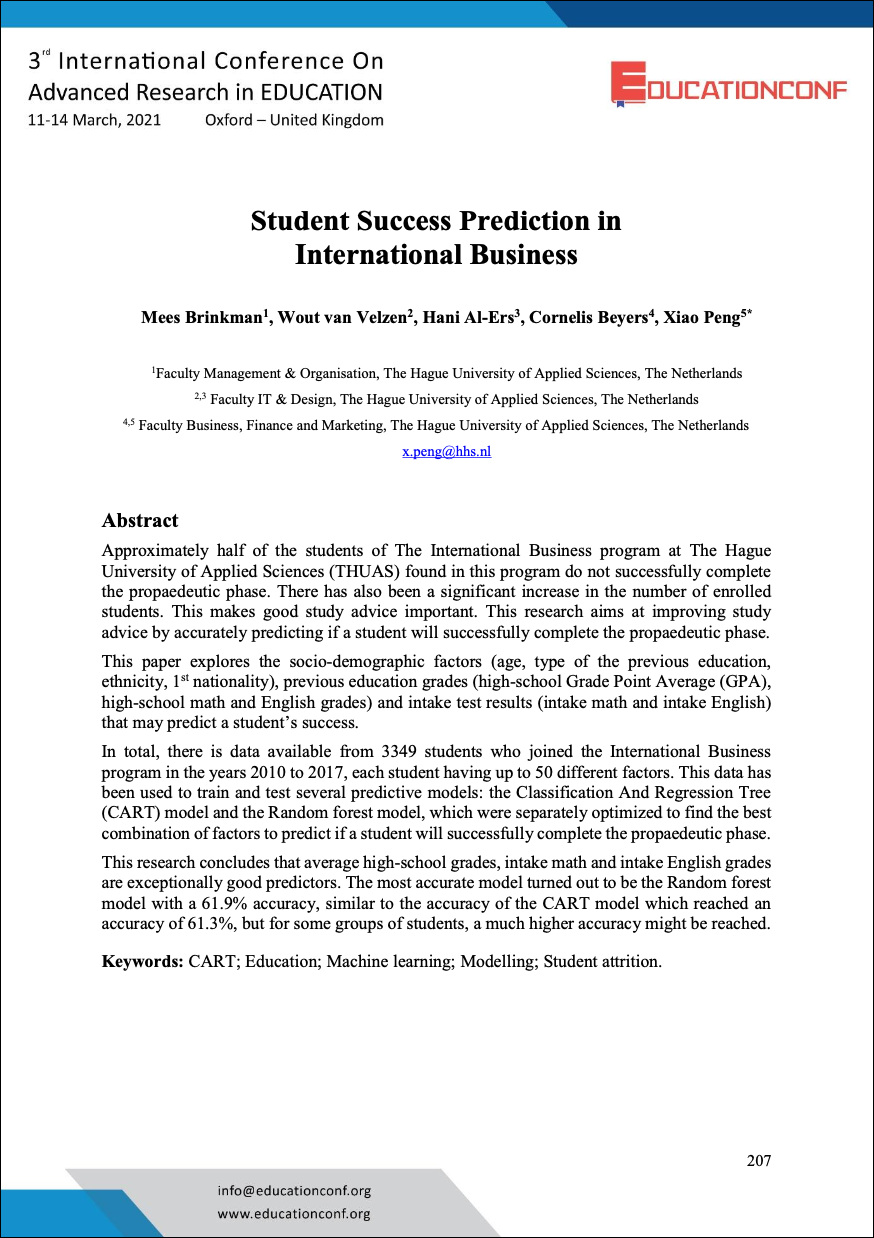In the world of higher education, it is important to know what helps students succeed. On this page, we have shared two related research projects from The Hague University of Applied Sciences. Both focus on understanding success in the International Business bachelor’s program. These projects were led by a team from the Data Innovation Hub at the university. This team also guided students in analyzing the data and writing up the results.
Both studies aim to give a complete picture of what factors contribute to student success. As you read on, you will learn about the methods used, the main discoveries, and what these findings might mean for education more broadly.
Background influence on student success
This study offers vital insights into the predictors of student success in their first year of the International Business bachelor’s program. While various factors play a role in determining student success, this study underscores the preeminence of prior educational achievements, particularly in math.
It’s noteworthy that the socio-economic status, often referenced in the wider literature as a primary determinant of academic success, did not emerge as a significant factor in our study. This might be attributed to the specific context of The Hague University’s International Business program or due to the absence of comprehensive socio-economic data.
The negligible correlation between intake tests and student success is a revelation that warrants further investigation. If universities are to harness these tests as predictors of success, then the nature and content of these exams require revisiting.
Implications for Educational Institutions
Given the outcomes of this research, educational institutions should consider emphasizing foundational subjects like math during the pre-bachelor phase. For students with a weaker foundation, supplemental resources and support can be provided to ensure they are better prepared for the rigors of the International Business bachelor’s program.
Furthermore, the negligible impact of intake tests suggests that universities might need to revisit their admission criteria and perhaps place more weight on pre-bachelor grades, particularly in math.
Limitations & Future Research
While this study offers several valuable insights, it’s important to acknowledge its limitations. Primarily, the absence of socio-economic data and the exclusive focus on The Hague University’s International Business program might limit the generalizability of the findings.
For future research, a more holistic approach encompassing a wider array of factors, including socio-economic status, could offer a more nuanced understanding of student success predictors. Moreover, investigating other academic programs can determine whether the findings here are specific to the International Business program or if they hold true across different disciplines.
Conclusion
In conclusion, this study illuminates the multifaceted nature of student success in higher education. While prior academic achievements, particularly in math, emerge as significant predictors, other factors like intake test scores seem less consequential. As the educational landscape continues to evolve, it’s crucial for institutions to regularly reassess the determinants of student success and tailor their strategies accordingly.
Student Success Prediction in International Business
The International Business program at The Hague University of Applied Sciences (THUAS) has seen an increase in enrollment over the years. However, approximately half of the students enrolled do not complete the preliminary phase successfully. This research, conducted by Mees Brinkman, Wout van Velzen, Hani Al-Ers, Cornelis Beyers, and Xiao Peng, aims to enhance study advice by predicting which students will complete this phase.
Objective:
The primary goal was to explore various factors that might influence a student’s success in the program. This includes socio-demographic factors such as age, type of previous education, ethnicity, and nationality, as well as academic indicators like high-school GPA, high-school math and English grades, and intake test results.
Methodology:
Using data from 3,349 students who joined the program between 2010 to 2017, the team utilized two predictive models: the Classification And Regression Tree (CART) model and the Random forest model. These models were optimized to determine the best combination of factors for prediction.
Key Findings:
- Factors of Influence: The research found that average high-school grades, intake math, and intake English grades were significant predictors of student success.
- Model Efficiency: The Random forest model yielded an accuracy of 61.9%, while the CART model achieved an accuracy of 61.3%. While the Random forest model was slightly more accurate, the CART model’s simplicity and clarity make it more suitable for practical applications.
- Implications: By accurately predicting student success, institutions can offer better study advice, potentially reducing the number of students who drop out or fail to complete their program.
Conclusion:
The research provides valuable insights into predicting student success in the International Business program at THUAS. By leveraging the CART model, educational institutions can enhance their study advice process, ensuring that students receive the support and guidance they need to succeed in their academic journey. This not only benefits the students but also helps institutions maintain a high success rate and reputation. Future research could delve deeper into other potential factors influencing student success or refine the existing predictive models for even greater accuracy.




